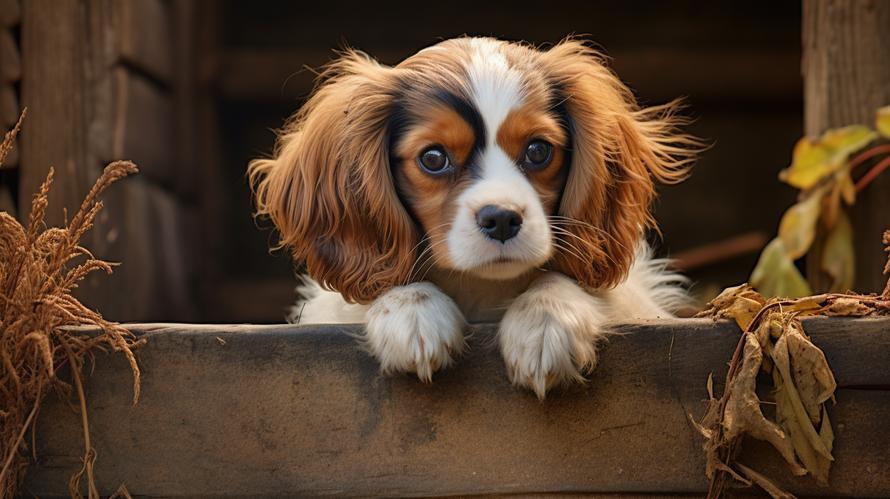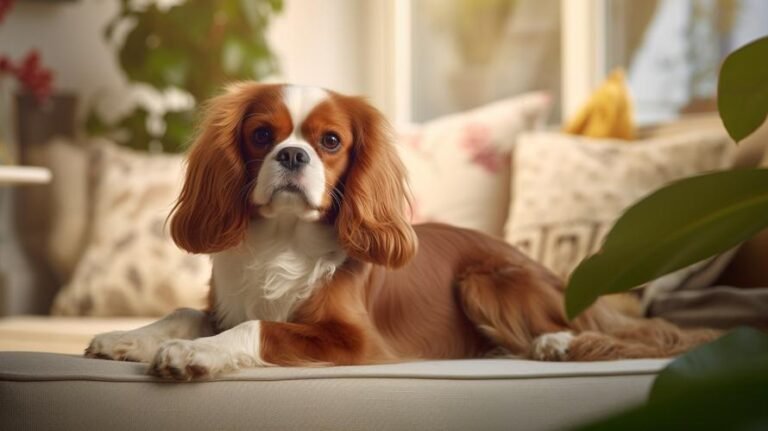Known for their regal bearing and history within the royal courts of England, the Cavalier King Charles Spaniel are as enchanting as their name. With their liquid, doe-like eyes and sumptuous silken ears, these dogs look more likely to be embroidered onto a fancy cushion than to be found keeping watch behind the castle gates. But are these ever-popular companion dogs suitable for a more serious role as a guard dog?
Let’s start off by dispelling a common myth about breeds in the Toy category. While they may be small, these dogs are not simply for show or companionship. Many of them were bred and used for practical purposes such as hunting or herding.
The Cavalier King Charles Spaniel, for example, is a direct descendant from the King Charles Spaniel, a breed that was kept for warming laps in chilly, drafty castles, and attracting fleas away from their royal owners! As an interesting side note, these spaniels used to have longer snouts, but the short snout that we know today was introduced due to a preference by King Charles II himself.
Now, back to our central question: Could your Cavalier King Charles Spaniel double up as a guard dog? Guard dogs are known for their intelligence, physical strength, and a fiercely protective nature. Therefore, to answer this, we have to dig deeper into the knack of this charming breed.
When it comes to intelligence, the Cavalier King Charles Spaniel is no slouch. Ranked 44 out of 138 breeds for intelligence, they are known to grasp new tricks and commands effortlessly. However, their sheer gentleness and eagerness to please often overshadow their intellect. They are incredibly friendly, even to strangers, which may not directly align with the traits of a typical guard dog.
Physical strength is another component that factors into the effectiveness of a guard dog. Spaniels are robust for their size but lack the physical presence that can function as a deterrent to intruders. In short, their strength might be better suited for retrieving a lost ball from under the sofa, rather than fending off a would-be burglar.
Finally, the protective nature: Cavaliers seem to have a boundless supply of affection and love for their family, but they aren’t territorial or aggressive. They tend to retreat in uncertain situations rather than confront them head-on. This reflects their legacy of being kept mostly for companionship and pampering throughout their breed’s history.
However, from a broader perspective, a guard dog’s role isn’t entirely about physical protection. They are also expected to alert their owners to potential dangers. Here, our Cavalier friends might prove to be of use. While they are not yappy like some small breeds, Cavaliers can be somewhat vocal when someone approaches their home. They have sharp senses, being sensitive to changes in their environment, which could make them good watchdogs – alerting their owners about possible intruders.
Now, does this make our adorable Cavaliers guard dogs? Well, let’s be honest – if you’re looking for a dog that will bark the house down at the first sign of trouble or can keep you safe on a dark night, the Cavalier King Charles Spaniel might not fit the bill. However, if you’re looking for a dog that is a lovely companion, intelligent and a gentle – though somewhat barking – alarm system, then this breed could just be perfect for you.
While the Cavaliers may lack the classic traits of a guard dog, they can provide a different kind of security – emotional support and companionship. In the end, it all depends on what one looks for in a pet. If you crave constant companionship, boundless affection, and a gentle warning bark now and then, a Cavalier King Charles Spaniel may actually be guarding your heart!
Remember, selecting a dog breed should also account for your lifestyle, activity level, and home environment. While Cavaliers may not guard your house, they will undoubtedly guard your happiness.



